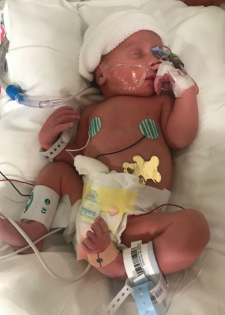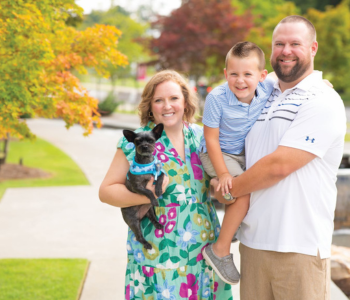“When we had a chance to purchase our first D-BAT franchise location, it was a perfect way to keep baseball in our lives,” David said.
Die-hard baseball fans — especially when it comes to the Atlanta Braves — the couple also have a dog named Wrigley, named for the iconic home of the Chicago Cubs, Wrigley Field.
When the couple decided to have a baby, the first challenge was to make sure that Heather was in good enough health — she’d undergone a heart procedure in 2011.
“I had supraventricular tachycardia,” Heather said. “My heart would beat really fast on its own while I was at rest. I had surgery to correct that and even after that I was on medication to help with palpitations and different things."
The couple found out they were expecting the week of Mother’s Day in 2018 after months of trying to conceive.
“Our pregnancy was actually very easy,” Heather said. “There were no complications and I didn’t really even have any morning sickness. It was just easy.”
According to David, Heather did have a few weird cravings here and there, but other than that it was a textbook pregnancy.
“We had a baby shower at the University of West Georgia the weekend before Thanksgiving,” Heather said. “We went on a tour of the baby area at the Tanner hospital in Carrollton that morning before the shower and one of the nurses said that they had ‘better not see us anytime soon.’”
The following Monday, everything changed at a routine check-up. From that day on, there is little that Heather remembers, but David recalls the time clearly.
A premature arrival
“When they took her blood pressure at the beginning of the appointment, it was a little high,” David said. “When they checked it again later in the appointment, it had risen even higher. They wanted to do lab work, but due to the holiday the lab was closed and they sent us to the hospital for blood work.”
Because of her heart issues, Heather had a urine protein test at the beginning of her pregnancy. Once they arrived at the hospital, they had her do another test and asked her to stay overnight. Her blood pressure steadily began to rise and they started her on magnesium to control it while moving her over to the hospital’s labor and delivery unit as a precaution. By Wednesday, the doctors felt comfortable taking her off the magnesium.
But Heather would not leave the hospital until many weeks later.
“You can’t get out of bed while on the magnesium sulfate,” Heather said. “I do remember that being awful. I was so thirsty and I remember wanting grape Fanta.”
As soon as Heather was off the magnesium, her blood pressure started to rise dangerously again. On Thanksgiving, the decision was made to induce labor — even though it would mean a premature delivery at only 33 weeks.
“They prepared us for the fact that our baby would be in the NICU and what to expect,” David said. “The prospect of losing them never entered my mind. Up until then, I was confident that even if the baby came early, it would be OK. Heather would be OK and everything would go back to normal. I was in shock.”
To make matters worse, Heather’s epidural didn’t take. While in active labor, there was one moment of levity with Heather’s obstetrician, Amy Goss, MD, with Tanner Healthcare for Women.
“There I am holding one of Heather’s legs and Dr. Goss is looking after Heather and Heather’s phone rings,” David said with a laugh. “It was Dr. Goss’ office calling to remind her of her appointment next week. Dr. Goss just smiled at us and said not to worry that she would take care of it.”
As if everything happening was not enough, the hospital’s fire alarm began to go off at the peak of Heather’s labor.
“Dr. Goss said not to worry and that we were not leaving without this baby,” David said. “She sent someone to find out what was going on and there turned out to be a fire in the kitchen down below, but it was already under control. There was also construction going on in the room next to us with hammers and jack hammers daily.”
David said that the NICU team had told them they would be taking the baby as soon as he was born, if needed, and they did. The couple found out later that their son, Lyndon, stopped breathing once born, and had to be resuscitated.
“I stayed with Heather and it was about two to three hours before I was allowed to go see him in the NICU,” David said.
Milestones in the NICU
By the next morning, Lyndon had improved so much that he began to earn his first awards in his life.
“One of the NICU nurses there does artwork,” Heather said. “She creates badges to show each milestone, like their first bottle. The badges look like little medals. She draws and colors them for the babies.”
David said it was almost a full 24 hours for the magnesium sulfate to be out of Heather’s system enough to see her baby in person for the first time.

“The first time I saw him was hard,” David said. “I just wanted to hold him, but he was hooked up to all these wires and tubes and I couldn’t. It was difficult to see him in that state. It’s not the picture I had in my head of what becoming a parent would be like.”
Heather doesn’t even remember seeing him after he was born because she was so ill.
“You picture how you want it to go and ours was everything but that,” Heather said. “You almost feel like you did something wrong because it was my body that caused all of this, but I’m so grateful I was in a place where they could help him. The real first time it feels like I saw him was when I got to hold him on Saturday.”
While Heather’s blood pressure remained elevated, baby Lyndon was improving by the hour. The NICU team first thought he would be there for up to seven weeks, but he was ready to go home after four days.
Heather remained on two medications, five times per day. When the doctors and nurses were confident that Heather’s blood pressure was under control, the family was finally allowed to go home with two medications after a 12-day stay in the hospital. She continues to take one medication to this day.
“Dr. Goss was so calm and that’s exactly what we needed,” Heather said. “She didn’t panic when the fire alarm was going off, when my blood pressure continued to rise, nothing.”
David credits Dr. Goss, the NICU team and the nurses at Tanner for keeping the family together in unimaginable circumstances.
“We always felt heard and their confidence helped us,” David said.
Embracing imperfection
Both Heather and David said that their families were pillars of strength and support during their ordeal. Heather’s father was diagnosed with early onset Alzheimer’s in 2015 at only 54 years old. He passed away in December 2019 and looking back at the time, if Lyndon had not come early, he would not have had one of each holiday with him prior to his death.
“I question why my body did what it did,” Heather said. “I’m a person that always looks for answers and had Lyndon not come early, he wouldn’t have celebrated both a Christmas and a birthday with my dad.”
They also credit their faith with helping them to endure and enjoy nightly prayer times with their son.
“If we try to put him to bed without it, he reminds us,” David said.
Both Heather and David said it was important to them to share their story because a situation like this can happen to anyone and it’s important to be informed.
“I had never even heard of preeclampsia before this,” David said.
For Heather, it was hard to process how her birth experience went in comparison to what is seen on social media — portrayals of perfect bodies right after birth or serene birth experiences. She said it’s important to normalize that things can and do veer from perfection, but if you are surrounded by care teams, family and friends with your best interests at heart, things can still turn out OK.

Still, the experience didn’t help the postpartum depression that Heather also endured after Lyndon’s arrival.
“I didn’t even know I had it,” Heather said. “The questions they asked me at my post-delivery visit, I answered ‘no’ to because the answer was ‘no.’ I didn’t feel like harming my child or anything like that. I didn’t realize that feeling overwhelmed or feeling like I didn’t know what to do or feeling like I wasn’t good enough were symptoms of postpartum depression.”
Heather felt like she put too much pressure on herself to make sure that all of Lyndon’s “firsts” were perfect.
“His first Christmas, he was just a month old and he won’t even remember it, but I felt like it had to be perfect,” Heather said.
The couple agrees that it’s OK to ask for help and to take advantage of the excellent resources available.
Both Heather and David believe that they are blessed to have had the Tanner “family” to care for them before, during and after their pregnancy. They will be celebrating Lyndon’s fifth birthday this year and are grateful to be a Tanner NICU success story.